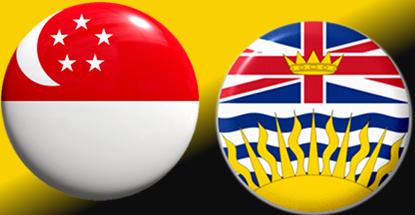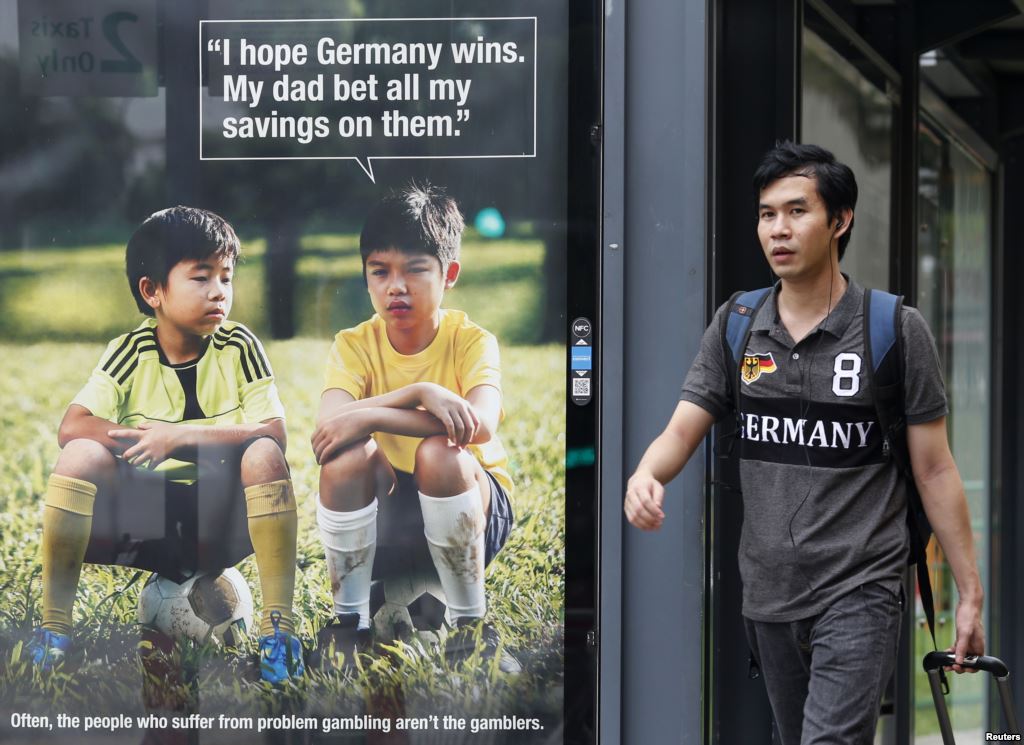Problem Gambling In Singapore
Singapore Pools and Singapore Turf Club are adoptees of the Responsible Gambling Code of Practice introduced by the National Council on Problem Gambling (NCPG). Both operators have in place responsible gambling measures such as self-exclusion, employee training and patron education that meet industry standards. Problem gambling has been linked to these factors, and one would expect problem gambling to be on the rise in South Dakota due to the spread of legalized gambling. Therefore a worsening in one or more of these factors may suggest that at least part of the costs are due to problem gambling. Gambling: A Staple of Singaporean Life Gambling addiction is a widespread problem to be sure – in fact, studies show that up to 5.8 per cent of the world’s population struggles with problem gambling. And the problem is especially pronounced in Singapore, where the avenues to gambling are plentiful.
Advice from private investigator James Loh:
Problem gambling refers to the behaviour of persons who are addicted to gambling. Like any addiction, symptoms can range from the mild to the severe. The most serious form of the gambling is called “Pathological” or “Compulsive” Gambling.
- National Council on Problem Gambling - Singapore added 5 new photos to the album: NCPG Website Maintenance. December 2 at 12:06 AM The NCPG Website will be undergoing scheduled maintenance from 11 Dec 2020 (Fri), 10pm to 12 Dec 2020 (Sat).
- If you suspect that a family member or partner may have a gambling problem, our family therapy and marriage counseling services at the Singapore Counselling Centre can be an extra support in helping your loved one to escape from his or her addiction.
The establishment of the twin integrated resorts and casinos in Singapore has contributed to the cases of problem gambling locally. After all, casino games and casino environments are deliberately designed to induce players to gamble more. Occasionally, people look to private investigators like me to check up on the gambling activities of their family members so they can do something about it.
Identifying the gambling habit
The victims could be our loved ones. It is best to identify problem gambling early on so that something can be done. The following are some tell-tale signs of a gambling habit:
- Lying about the small things: People who have gambling problems generally try to hide such problems from the people around them. They may start lying to their spouses, families, co-workers and friends. They may also hide bills, past-due notices, winnings or losses from partners/family members
- Retirees leaving home for long hours at a stretch: Suspicion should be aroused when these trips are made to venues which host a casino/gambling facility – e.g. country clubs and the integrated resorts. However, the subject may also be unwilling to reveal the nature of their movements when asked. In that case, it may be unwise to press the issue as it could lead to arguments/conflict and cause the subject to become more guarded about his or her activities
- Financial troubles: Constantly not having enough cash for daily expenses and/or having increased debt and/or unpaid bills. This may happen because the gambler is spending more money on gambling than he can afford.
- Mood changes: The subject may become constantly distressed, frustrated and irritable and/or demonstrate less patience when dealing with normal, everyday activities with no overtly identifiable reason
- Borrowing money: Pathological gamblers inevitably find themselves in a financial hole and may resort to borrowing from family, friends, co-workers or even strangers, without always admitting the real reason behind their need for cash. They may also max out their credit cards, sell things for quick cash and/or take out a second mortgage
- Strained relationships and declining work performance/loss of job: Problem gambling causes harm to both the gambler and his or her family. It could lead to increased conflict with friends or family over money or the subject’s gambling habits and/or increasing isolation from family and friends
The above are guidelines to allow you to either confirm or deny your suspicions about whether a relative has a gambling problem. However, they are not meant to be conclusive nor exhaustive and should not be regarded in isolation.
How much gambling is too much?
Should the subject’s gambling habits be known, the following are tell-tale signs that an innocuous habit may be pathological:
- Chasing losses: This happens when gamblers attempt to win back the money they have lost. They may claim that they will quit gambling once they “strike it big” or blame the loss on (lack of) luck or wrong strategies used. However, when they chase their losses, they end up incurring more losses and often land themselves in severe debt
- Increase in betting amounts: Like someone who has drug or alcohol problems, problem gamblers have to up their “dose” of gambling to enjoy it. In other words, they have to bet more and more money to get the kind of rush they want
- Obsession over gambling: When a subject is constantly thinking or talking about gambling, it may be a sign of addiction. The subject may also start to neglect social life and family time in order to spend more money and time on gambling
Actions you can take
Confronting the subject head-on may cause the subject to become defensive and lead to unpleasant arguments. Instead, you can take the following measures, especially if you know that the subject has a weakness for gambling:
- Find the identities of the subject’s gambling partners (if any): They may turn out to be part of an illegal syndicate. If so, it is advisable to report your findings to the relevant authorities.
- Employ a trained Private Investigator to conduct discreet physical surveillance: The PI will be able to conduct surveillance in casinos and provide you with accurate information about the subject’s movements and activities.
- Apply for a Casino Exclusion order (http://www.ncpg.org.sg/en/Pages/DealWithProblemGambling.aspx?category=2)
- Monitor the well-being of the subject: If the subject is facing financial troubles as a result of his/her gambling problem, he/she may become increasingly depressed and may resort to borrowing from illegal moneylenders or even contemplate suicide
- Seek professional help: Encourage the subject to go for counselling services and/or call the National Problem Gambling Helpline 1800-6-668-668 for help and advice
- Take control of finances: Where the problem is severe, guard savings accounts and make them inaccessible to the gambler and/or close all joint checking and savings accounts and create new accounts in your name only.
This article is written by James Loh, managing director of International Investigators Pte Ltd
Need a lawyer to assist with your legal matters?
These lawyers are selected based on their number of positive reviews and years of experience in this subject you are enquiring about.
Ok, got it
Here are 5 trusted lawyers you can contact directly for a quote.
Singapore is rightly considered to be one of Asia's largest gaming centres, but even 15 years ago gambling was strictly forbidden in the country. How did the country manage to make such a rapid leap, and whether there are still any peaks that have not been taken for operators.
Singapore, like many other conservative countries, refused to legalise the gambling industry for a long time, but then, in 2005, there was a paradigm shift in the government's attitude: the market did not just earn, but became an example for others.
Before analysing the current state of affairs, we suggest finding out where it all started.

The history of the gambling industry in Singapore
The history of the gambling industry in Singapore goes back to colonial times. In 1923, the British government decided to legalise gambling. However, the first experiment proved extremely unsuccessful and ludomania and an increase in crime began to flourish in the colony. Gambling addiction and the criminalisation of society led to gambling again being out of legal bounds for many years to come. There were only two types of gaming, lottery operations and racing bets, which made it an exceptional place. But in 2005, fortunately for users and operators, there was a breakthrough - Singapore's Prime Minister Lee Hsien Loon announced the government's decision to create two integrated resorts in the southern part of the country - on Sentosa Island. The aim of legalising the gambling business in this format was to improve the tourism infrastructure. In addition to the fact that the gaming industry could and did contribute to the growth of tourism and entertainment, Singapore needed to become part of a market in which neighbouring countries had already expanded their activities. In the same year, a tender was announced for the right to build, develop and manage an integrated resort. Three companies took part in the tender for the construction of a casino resort on Sentosa Island. The winner was a joint project by Genting International and architect Michael Graves. The Resorts World Sentosa gambling house was opened in February 2010. The second tender attracted a wider audience and 19 companies took part. The proposal from Las Vegas Sands was considered the best, not least of which was the impressive architectural project by Moshe Safdi. The Marina Bay Sands Casino was opened in April 2010. The building housing the gambling house was later recognised as the most expensive in the world. Investments in its creation amounted to $5.7 billion. Read about the expansion of the project in a separate article.
Gambling industry in Singapore: general data
Legislation .
Problem Gambling In Singapore Today
The land-based gambling segment in Singapore is regulated by three laws at once: on rates, on gambling houses and on private lotteries.
The online gambling segment is regulated by the law on remote gambling. This not only refers to online casinos, but also to remote betting and lottery operations.

Regulator
The gaming industry in Singapore is supervised by several government agencies. Ground-based gambling establishments are supervised by CRA. The authority is responsible for licensing land segment operators. The Criminal Investigation Department of Singapore is responsible for identifying and enforcing decisions related to violations in the industry.
In addition, the Ministry of Home Affairs (MHA), the Media Development Authority (IMDA) and the Monetary Authority of Singapore (MAS) are also involved in managing the industry. The MHA is responsible for some aspects of operators' work, such as blocking payments to unlicensed operators or access to online platforms.
The Ministry of Social and Family Development and the National Council on Problem Gambling (NCPG) ensure that the potential harm associated with gambling operations is minimised. NCPG is also responsible for restricting access to gambling activities.
The Singapore Totalizator Council oversees the work of Singapore Turf Club and Singapore Pools, the two main operators that organise betting on horse racing.
It should be noted that the dominance of agencies responsible for the gambling industry will soon be reformed. You can read about exactly how in a separate section of the article.
Allowed forms of gambling
Problem Gambling Rates Singapore

In Singapore, such forms of gambling are permitted - poker, bookmaking, casino gambling - card and board games, lotteries.
Online gaming operations are prohibited in Singapore. In 2016, the Ministry of the Interior granted two state operators the right to organise online betting on the totalizator.